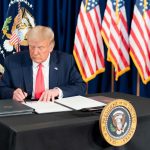In a particularly bold move, the Trump administration stood its ground in court, asserting that no “terrorist” would be knowingly flown into the United States on its watch. Deputy Assistant Attorney General Drew Ensign emphasized that by the time a judge issued a directive barring flights carrying Venezuelan gang suspects, those planes were already on their way, leaving U.S. airspace and thus, legally cleared for takeoff. It seems the judge’s timely orders were about as helpful as a snow shovel in July.
Ensign made it clear that the Trump administration wasn’t about to be cornered by the courts on this matter. Even if the judge’s injunction had been binding, the administration would argue that President Trump, with his keen eye on national security, certainly wasn’t obligated to comply with an order to reinstate flights already taking off. After all, refusing to admit foreign terrorists into the country is not just a suggestion, it’s practically a presidential duty wrapped in red, white, and blue.
The alleged terrorists in question are members of the Tren de Aragua, a Venezuelan crime syndicate that has recently earned the U.S. government’s colorful label of terrorist organization. Trump’s administration has classified them as enemies under the Alien Enemies Act, which should make their eviction from the United States faster than a speeding ticket. Yet, Judge James Boasberg, an Obama appointee, wants these suspects to have their day in court, as if anyone seriously believes they aren’t guilty by association.
DHS tells Judge James Boasberg that Trump couldn’t bring Venezuelan ‘terrorists’ back to U.S.https://t.co/pzTQvAgdoN pic.twitter.com/kpvsEcgZY2
— The Washington Times (@WashTimes) March 26, 2025
The constitutional showdown reveals a tangled web of legal wrangling between the executive and judicial branches. Boasberg’s orders to halt deportations and ground flights ran into a brick wall of law and logic, with those airborne planes already officially deporting their passengers. He might as well have been shouting orders to a school of fish in the ocean, wondering why they didn’t swim back to him.
With Boasberg seeking clarity and perhaps a bit of ego massage, the Trump administration isn’t keen to play ball. Citing state secrets, they defended their decisions and dismissed the judge’s actions as futile. The Justice Department argued that the only ruling of consequence was the written one, which didn’t demand that officials undo what had already been done—a notable legal loophole that calls into question the efficacy of judicial orders when national security is at stake.
The fireworks are far from over in this courtroom drama pitting the Trump administration against judicial oversight, particularly as the Democrats try to fight tooth and nail to slow down deportations of individuals they deem deserving of sympathy. But rest assured, the administration is not about to let a handful of legal hiccups keep it from acting to protect America.




